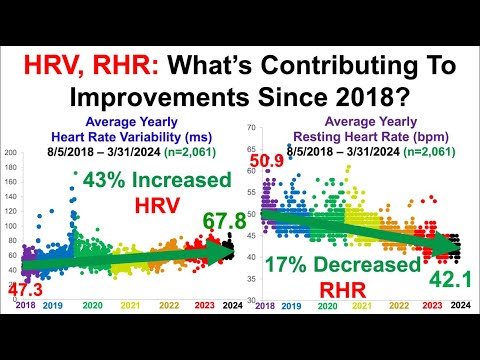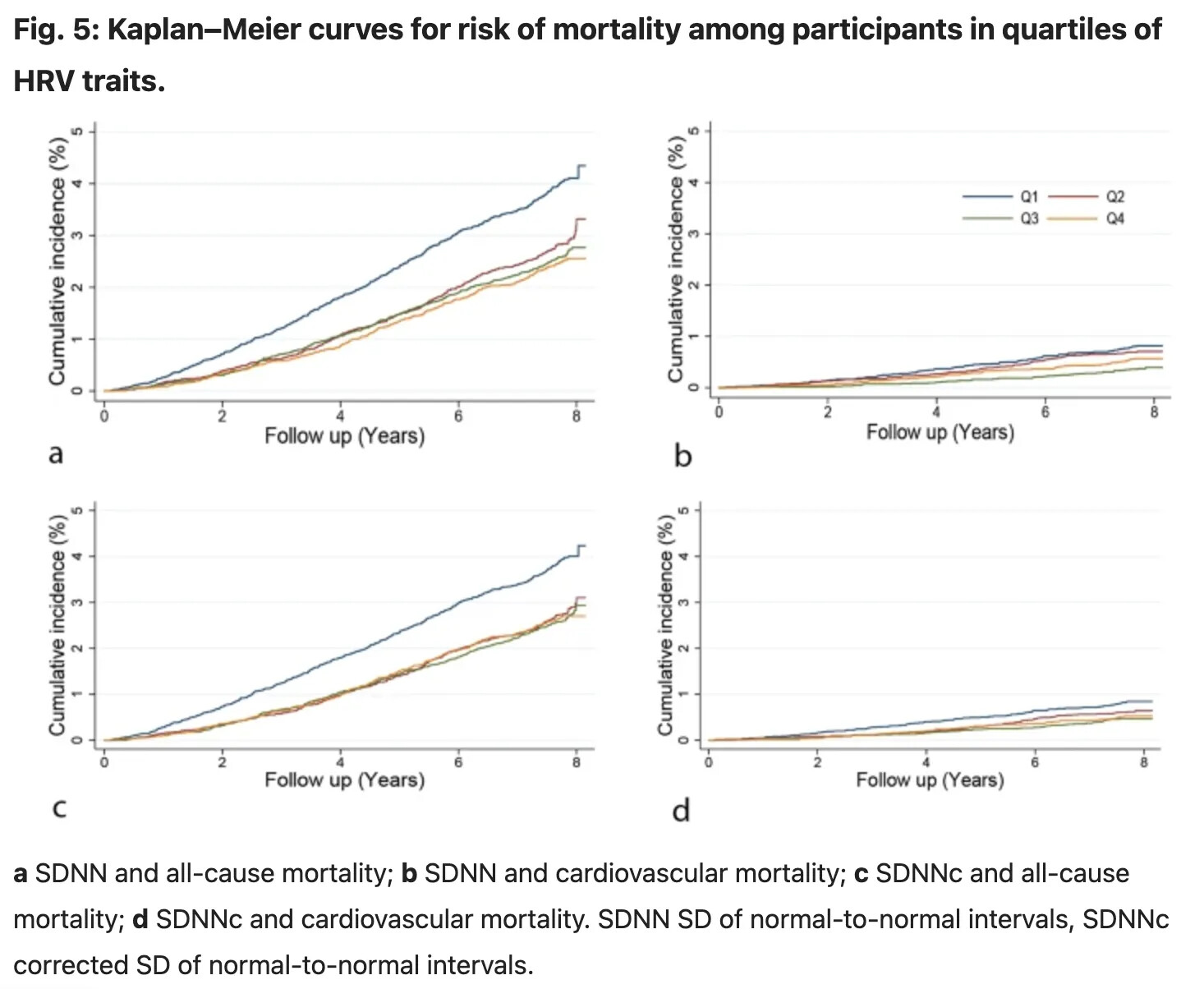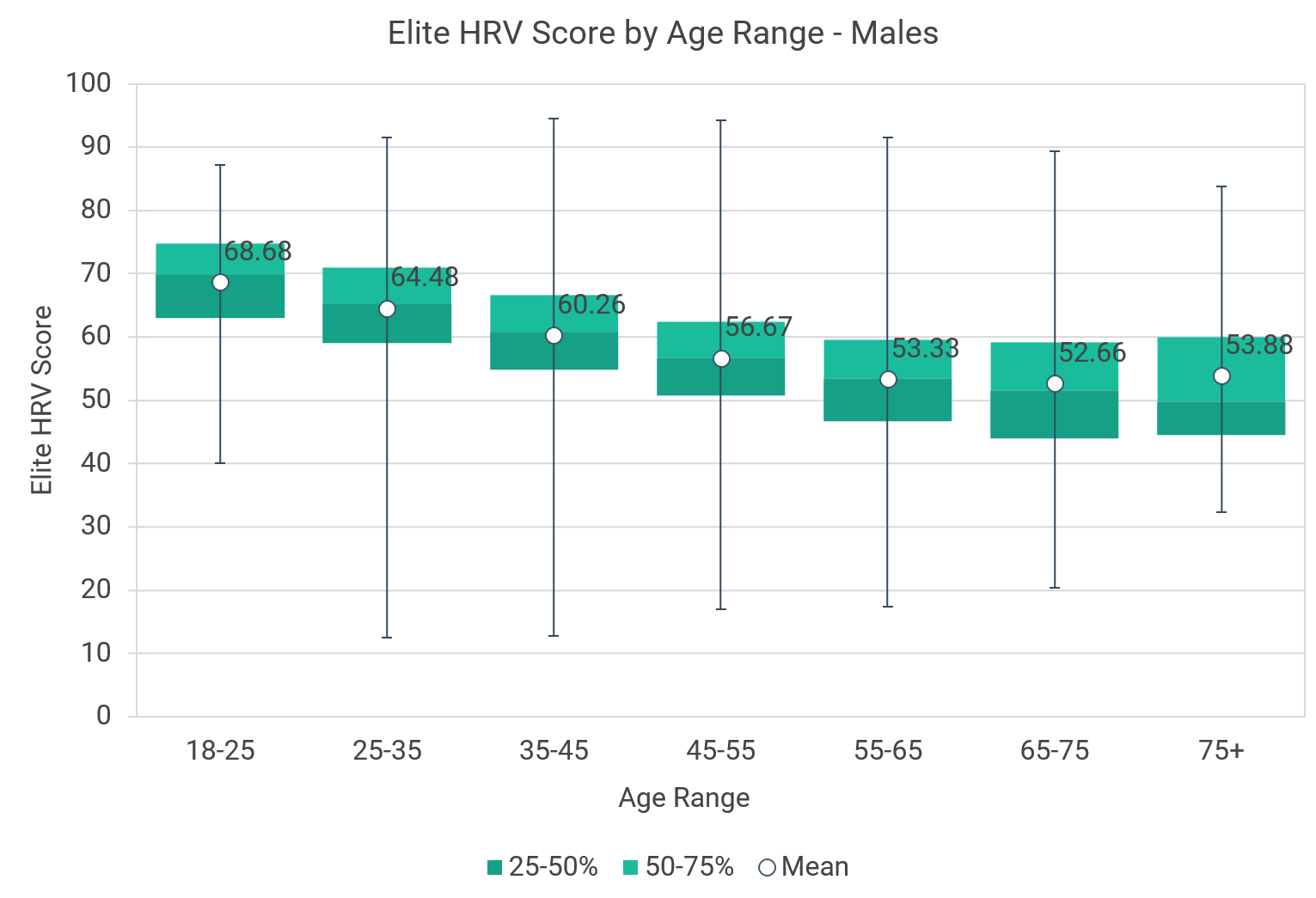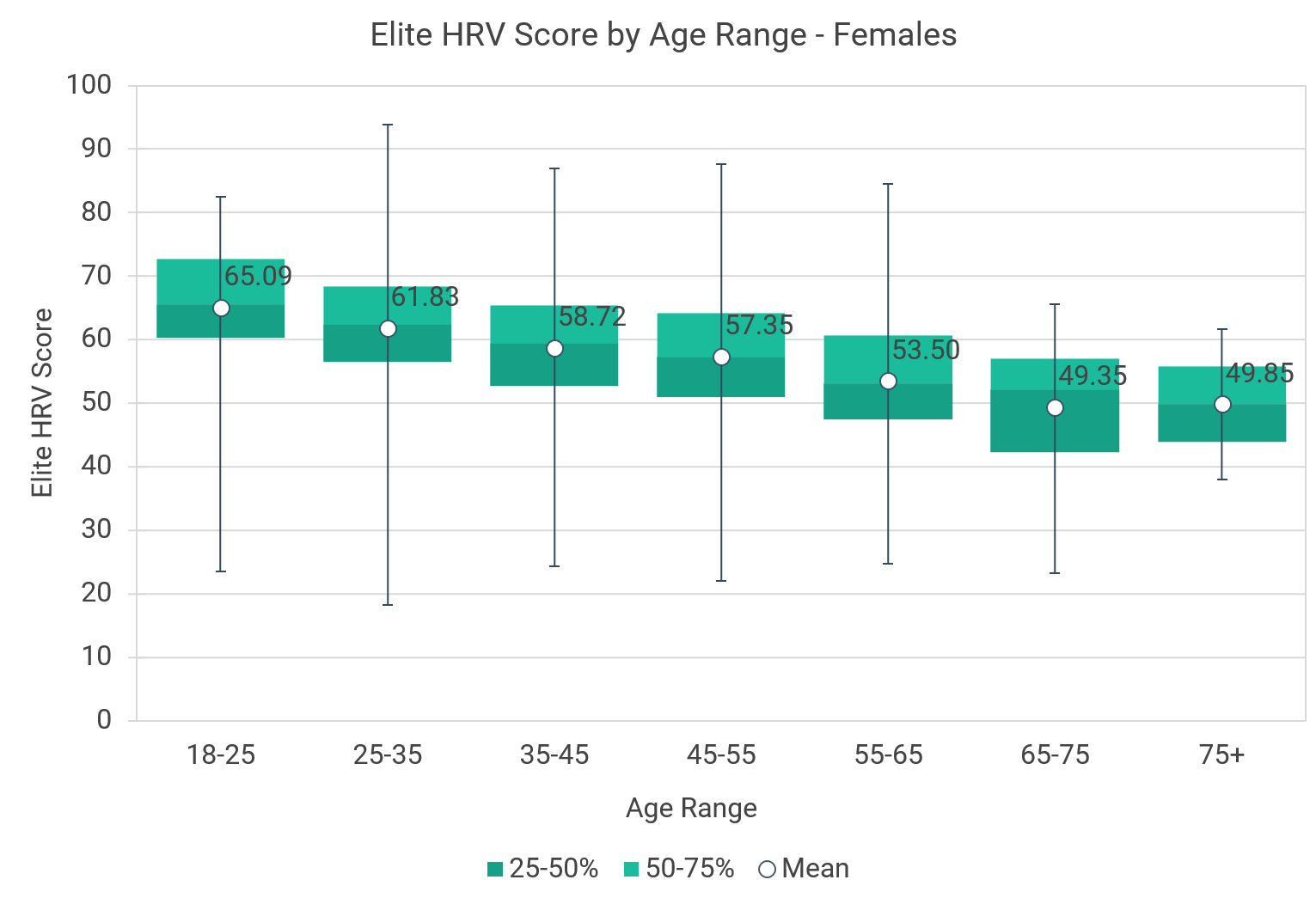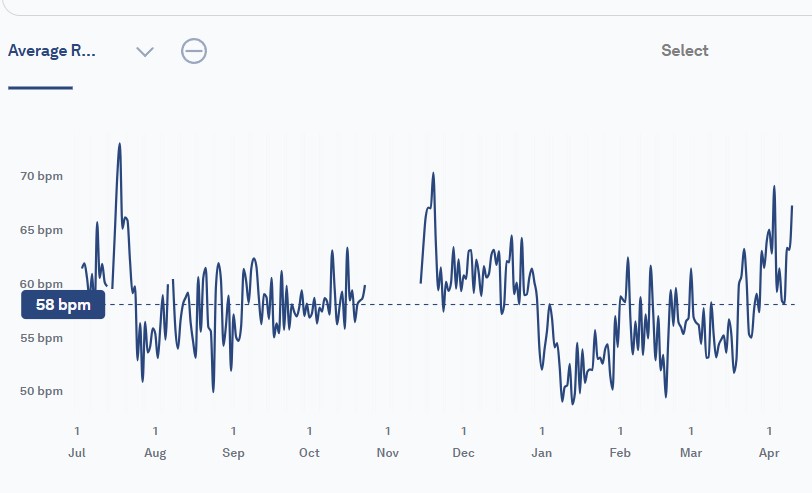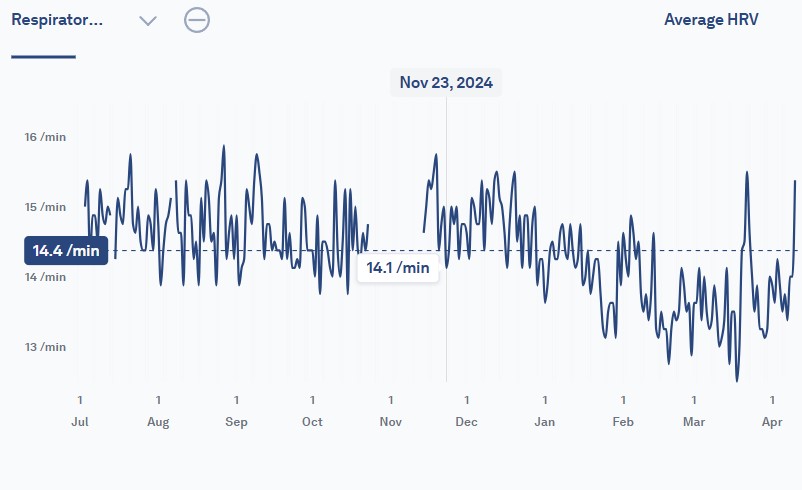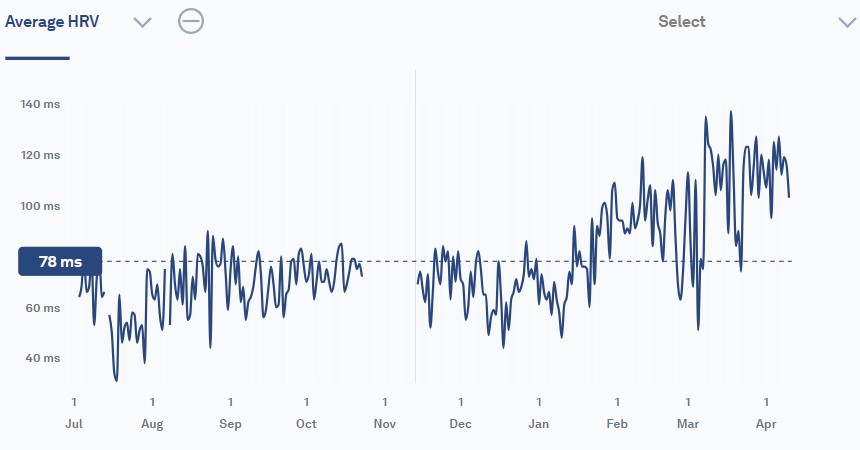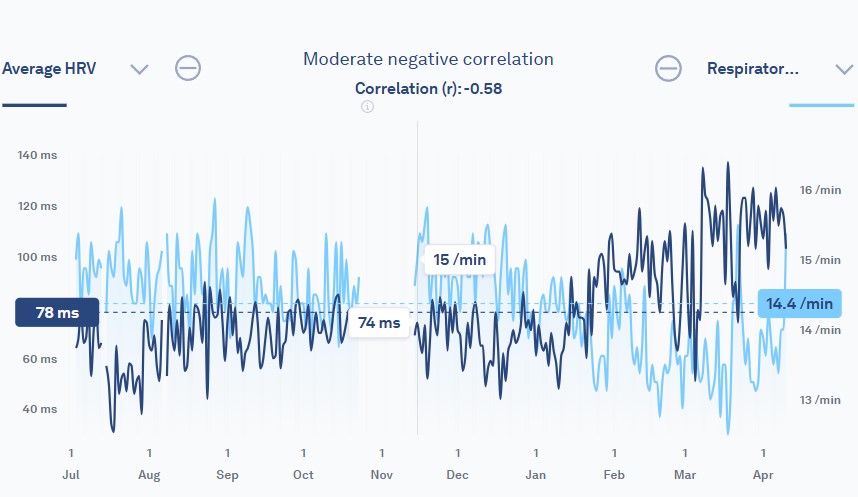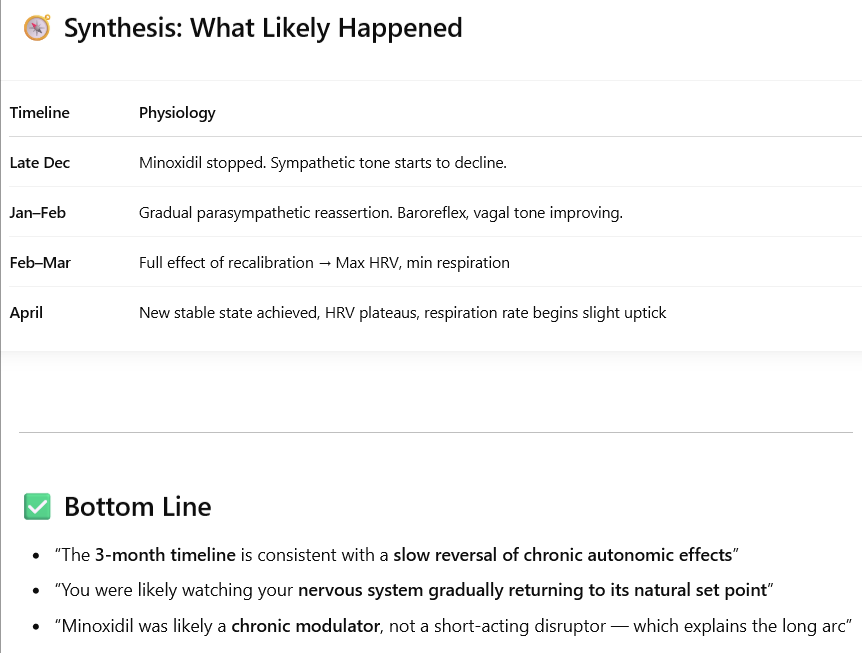HRV is something you are supposed to compare with yourself apparently and not others.
Two lines of thought in this thread.
‘HRV declines with age and is a sign of aging.’
‘Your level of HRV is unique to you, and only the trend matters. Absolute level is irrelevant.’
OK then.
Mostly agree, but would frame the second one more along the lines of
‘Your level of HRV is to a large extent unique to you, and it’s mostly the trend matters.’
And I would add a third one
’People can generally increase their HRV by a lot if they work to achieve that, and it is likely a good part of an optimal, holistic longevity playbook to do so.’
I use the Athlytic app mentioned by others and it looks at HRV and RHR to score your workout recovery. I only started taking Rap last Wednesday and my recovery tanked to 30% over a few days. This week it went down to 18% recovery with HRV 37% lower than 60 day average. Last time I saw numbers this low I was sick with Covid so I was a little concerned! I am hoping the numbers go the other way as that seems to be the goal!
Some people have reported previously that they see a temporary decrease in HRV immediately after taking rapamycin. But some have seen increases. See this thread: Rapamycin and HRV
Anyone have a though aboute SSRI and antidepressants in general and HRV ? It lowers mine a lot. I’m a bit concerned
HRV enthusiasts should watch the five minutes from here:
‘I don’t think people should use (HRV measures) as an indicator of anything…’
When do you measure your HRV?
What device do you use?
Both those variables make a difference in getting accurate and relevant data.
You only need to measure HRV one time, first thing in the morning. Any other time is irrelevant.
I posted a detailed doc on measuring, and improving HRV using tVNS here…
HRV - the Variable aspect of this measurement is exactly that, highly variable. As it should be, sometimes low, sometimes high variability.
This is why it’s useless to measure HRV in an ongoing manner (hour by hour, minute by minute), it’s basically meaningless. Walk a bit, sit a bit, work out, sleep, the HRV will vary significantly and not tell you anything useful.
But if you measure HRV 1 time a day, at close to the same time, under the “same” conditions, you can establish a trend. Spot HRV measurement is meaningless, I feel that the trend of 1 single daily measurement on the other hand has meaning.
What got me interested in HRV was using it as an indicator of ANS status, parasympathetic vs sympathetic. As we age the ANS becomes more sympathetic, this causes a number of issues both mental and physical.
When I started measuring it I found mine to be low - 40 to 47 over the first week of testing. Then I started tVNS, my HRV increased, my system became more consistently parasympathetic, my HRV increased to 57+ and is holding at that number for over 3 years now.
The app I use is used by a lot of fitness people, I’m not that. Yet I scored above average for my age group. Certainly not because I was fit LoL! I was obese and very low on the fitness scale during that process. Today, I’m not obese and my fitness level is getting much better. And interestingly my HRV has not “improved” through that 14 month transformation.
So I’ll keep doing tVNS 3 to 4 times a week, when there is a hockey game on, Go Leafs Go!
To answer your initial question @AlexKChen:
Phenotypic but not genetically predicted heart rate variability associated with all-cause mortality 2023
We performed Kaplan–Meier analyses to compare the risk of death for quartiles of HRV traits (considering the 4th quartile with the highest HRV values as a reference) (Figs. 4 and 5 and Supplementary Data 3).
Participants in the 1st (lowest) quartile at baseline for RMSSD and SDNN had 1.31 (95% CI: 1.15–1.51; P = 9.29 × 10−5) and 1.46 (95% CI: 1.27–1.68; P = 1.16 × 10−7) times higher risk of death from any cause compared to participants in the highest quartile.
It seems that as long as you’re not in the bottom quintile for HRV, your HRV doesn’t matter much. Unfortunately, they don’t give the quartiles. But Elite HRV provides that (I assume that Elite HRV users have better HRV than the overall population but it gives an idea): Normative HRV Scores by Age and Gender [Heart Rate Variability Chart]
See also: THE INTERPLAY OF HEART RATE VARIABILITY AND RESTING HEART RATE ON MORTALITY IN TYPE 2 DIABETES 2024
During a mean 9.9-year follow-up, 1,321 deaths were ascertained, including 443 cardiovascular deaths. Low SDNN was associated with increased all-cause mortality in the high RHR group (HR 1.60; 95% CI 1.29-1.97), but not in the normal RHR group. Compared with the reference group (normal SDNN and normal RHR), the presence of either low SDNN or high RHR alone was not associated with all-cause mortality. In contrast, the combination of low SDNN and high RHR was associated with a significantly increased risk of all-cause mortality (HR 1.68; 95% CI 1.43-1.97). Similar findings were observed in analyses using rMSSD, and in MESA.
So HRV doesn’t matter that much unless very low (bottom quartile) and/or high RHR @Steve_Combi?
HRV varies quite a bit particularly depending upon whether the autonomous nervious system is in a parasympathetic state or sympathetic state.
Hence really any measurements need to take these things into account.
What do you mean John?
If you are in the parasympathetic state HRV will be higher. It will be lower in the sympathetic state.
Hence you cannot just measure a value and say that defines someones HRV. You need also to measure the activation of the HPA axis.
As noted by @John_Hemming HRV is quite “variable” in a depending manner. What is the depending manner? Activity and time of day will change a measured HRV. Does the study tell us how and when HRV was measured?
The Elite HRV data is probably more representative for people who are actively monitoring their HRV in the prescribed way, same time, same position, etc. But they are also more likely to be fit and active compared to a “normal” group of people.
The all cause mortality thing is very interesting and would indicate that staying out of the very low or very high ranges has some benefit.
My HRV was 57 this morning ![]() but Tuesday to Thursday I was in an extreme parasympathetic state and it was 63 and 67. Measured same time, same position.
but Tuesday to Thursday I was in an extreme parasympathetic state and it was 63 and 67. Measured same time, same position.
Since I’ve been taking TA-1 (thymosin alpha-1) the past week I expected something to indicate a change and the HRV seems to have performed as expected. I’m going to ride this experiment out and see what happens with the HRV as I plan on doing the TA-1 experiment until the end of the year.
tVNS is something that has increased my average HRV and put me in the mid range for the 65-75 age bracket. What does that mean? not sure but at least it’s not at the extremes.
I have noticed my SDNN is slowly increasing, even though I’ve been delinquent with the tVNS procedure. In the study the SDNN to HRV ratio at one extreme High SDNN, low HRV - not good. Then we see the Low SDNN, high RHR - not good.
Seems like these may be good health parameters to keep an eye on.
That’s actually a common misconception.
Predominance of either branches of autonomic systems parasympathetic or sympathetic can cause low HRV, albeit the predominance of parasympathetic is much less common.
Highest HRVs are achieved by a healthy balance of both branches.
I am going on the results from Elite HRV which tends to say these things. If it is wrong then fair enough.
I can tell subjectively depending upon how alert I feel as well. After drinking the afternoon/night before RHR will be higher, I will be to some extent vasodilated and HRV will be lower.
I have a HRV stimulator, I also got bay area peak performance to measure HRV (it’s higher eyes-open than eyes-closed, 40 EO and 30 EC).
It could be a symptom of rigidity in my brain waves in general (this could be related to the “developmental event”/“trauma” I have…)
I got to rent a vagus nerve stimulator
Maybe this is interesting, or maybe it isn’t.
Here are four Oura Ring graphs: RHR, Respiration rate, HRV, and Resp. Rate vs. HRV.
Data is daily from July 2024 (when ring first provided by Optispan) to date. In a (failed)attempt to isolate what seemed to be harming my kidneys, I stopped most all my polypharmacy Christmas week. (Overnight) RHR dropped about ten points in short order.
I didn’t start adding anything back until a month later. I have now added back everything as before, plus a couple things, most notably enclomiphene and astaxanthin, and RHR is back to the original elevated level. I have not yet added back minoxidil, which was my guess as to what had significanly contributed to the elevated RHRr seen pre-Christmas.
What is interesting to me is that Respiratory Rate seems to have chugged generally downward at a lagged pace, rather than immediately plummeting like RHR. Concomitent with that, HRV has steadily chugged higher, back to its rightfull location in the 120’s. (See the screenshot I replied to, from a three week OR trial in 2023.)
The last chart shows Resp Rate vs. HRV and a fairly strong .58 negative correlation.
Herer’s the last bits fromwhen I was quizzing chatgpt, guessing minoxidil was the source of the problem.
In sum, at least in the short run, my OR HRV has returned to its rightful place, the super iron-man athlete 120’s ![]() . But my RHR has also returned to elevated levels, and it remains to be seen if Respiration rate and HRV belatedly return to suppressed levels.
. But my RHR has also returned to elevated levels, and it remains to be seen if Respiration rate and HRV belatedly return to suppressed levels.
This was a pretty interesting video about @howonnoh from Youtube and how he increased his HRV from about 50-60 to nearly 200 at his peak. Today his average HRV is 140-150.
He explores a great deal including facilitating high stress/cortisol in the morning and low stress/cortisol in the evening (in part to help circadian rhythm). There is a large discussion around exercise including zone 2 and zone 4/5, sleep, the use of devices like pulsetto, nutrition, and much more. I hadn’t previously heard of @howonnoh but I’m glad to have been introduced to him.
